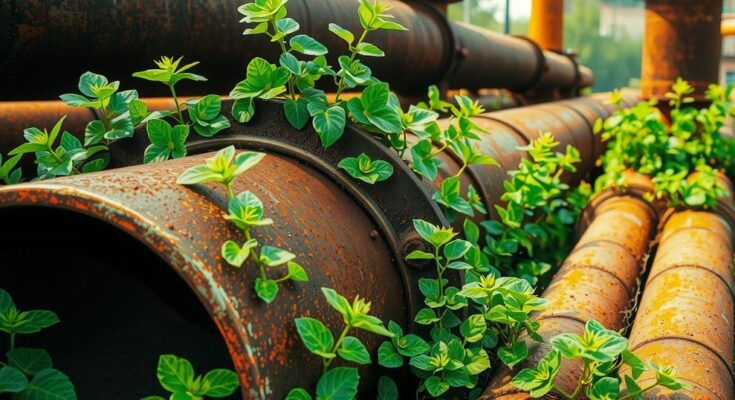Mr. Ibrahim Musah of WaterAid Ghana has highlighted that outdated distribution pipelines of Ghana Water Limited affect water quality in urban areas. He calls for increased government investment and emphasizes the unsustainable overreliance on donor funding in the WASH sector. Sustainable improvements in water and sanitation require initiatives such as Public-Private Partnerships and waste management innovations.
The Head of Strategy, Policy, and Campaigns at WaterAid Ghana, Mr. Ibrahim Musah, has raised concerns regarding the obsolete distribution pipelines of Ghana Water Limited (GWL), which he claims negatively impact the quality of water available to urban residents. He emphasized that the ageing infrastructure regularly faces issues such as rusting and bursts, resulting in frequent repairs and interruptions in supply.
Mr. Musah advocated for increased governmental investment in the urban water distribution network to mitigate these ongoing challenges. He pointed out that the maintenance and upgrading of the pipelines are essential to prevent significant water losses; presently, over half of the produced water is lost before reaching consumers. With rising water demands in urban areas, he noted that more extensive improvements are necessary for reliable and sustainable water management.
Further addressing the funding landscape for the Water, Sanitation, and Hygiene (WASH) sector, Mr. Musah highlighted that the reliance on donor funding is excessive. In 2022, 73% of the sector’s budget was donor-derived; alarmingly, this figure rose to 92% in 2023, reflecting a diminishing commitment from the Government of Ghana, which contributed only 8%. Such dependency on external funding is considered unsustainable by Mr. Musah, who urged a reversal of this trend to achieve national WASH targets and Sustainable Development Goals (SDGs).
Moreover, he pointed out the necessity for the Government of Ghana to engage in Public-Private Partnerships (PPPs) to attract private investment in water infrastructure. Mr. Musah underscored the urgency of addressing chronic water shortages faced by various regional capitals and rural areas where substantial investment is critical.
Compounding the water supply issue are challenges posed by illegal mining activities near GWL intake points in multiple regions. The Community Water and Sanitation Agency’s (CWSA) anticipated reforms require consistent funding to support the enhancement of rural water delivery services. Moreover, hygiene infrastructure investments in public spaces must be prioritized, as outlined in the Ghana WASH Sector Development Programme.
Mr. Musah also remarked that progress in hygiene initiatives established during the COVID-19 response is deteriorating, contributing to health hazards linked to stagnant water in uncovered pits. He called for improved sanitation practices, particularly the segregation of organic and inorganic waste, to facilitate the transformation of organic waste into biogas and fertilizer.
Moreover, he proposed that implementing circular economy principles could mitigate unsanitary conditions in metropolitan areas, provided that the government creates an inviting environment for private sector involvement. According to Mr. Musah, such collaboration could lead to job creation and a more prosperous future for the country.
In summary, Mr. Ibrahim Musah emphasizes the pressing need for the Ghanaian government to invest significantly in water infrastructure to address the challenges posed by outdated systems. The alarming reliance on donor funding underscores the importance of domestic investment in the WASH sector, as does the necessity for improved sanitation practices. Moreover, integrating circular economy principles could not only optimize waste management but also contribute to employment opportunities, enhancing overall national prosperity.
Original Source: www.gbcghanaonline.com




